Charlayne Hunter-Gault
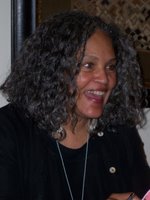
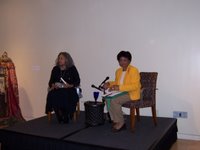
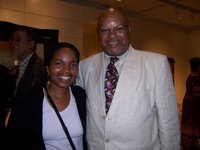
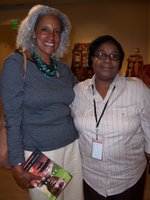
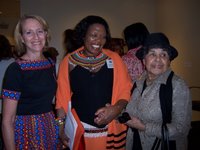
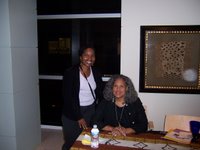
Tuesday evening I was able to see one of my favorite journalists, the first African American journalist whose career I began to follow once I saw her on the MacNeil/Lehrer News Hour where in 1985 she received broadcast journalist's highest honor: a George Foster Peabody Award, for her five-part series, "Apartheid's People."
On tour with a new book, New News Out of Africa: Uncovering Africa's Renaissance, Hunter-Gault spoke before a full to standing room only audience at the Museum of the African Diaspora in San Francisco. The South African Consul General Los Angeles, Jeanette T. Ndhlovu, was present, as well as Donna Katzin, Executive Director, Shared Interest, an organization which gives micro-loans to South African women entrepreneurs. Visit www.link2southafrica.com and www.sharedinterest.org.
After the African nation gained its independence and apartheid rule was no more, the journalist relocated to South Africa to cover the country from the inside for National Public Radio. Until recently she was Johannesburg Bureau Chief for CNN, now she will be working freelance on other stories which have interested her for a long time.
Hunter-Gault read from her book, introduced the reading with comments about her writing life and then entertained questions from the evening host, Belva Davis, KQED anchor for This Week in Northern California, and board president for MoAD.
Visit www.moadsf.org.
She stated that the future of Africa was in the face of the young woman on the cover of her book. Any African Renaissance has to include the strong, vibrant women of this vast land, and though the west is not necessarily covering Africa outside the death, disease, and destruction scenario, Hunter-Gault says there is much to celebrate such as the recent first free and democratic election in the Democratic Republic of the Congo.
In New News she writes about feeling as W.E.B. Dubois described it, "' ...a two-ness-- an American, and a Negro, two souls, two thoughts, two unrecognized strivings; two warring ideals in one dark body, whose dogged strength alone keeps it from being torn asunder.'"
She states that though the Dubois reference was to Africans on American soil, she "found herself thinking about this description as she was challenged to reconcile her spiritual, cultural, and historical connections to Africa not only with the detachment her profession requires but also with the way she was perceived in Africa: as a foreigner, as an American, and sometimes even as white!"
New News references this dichotomy Hunter-Gault faced when returning to America yearly and friends and family would ask for "the news." The book -- part memoir, part commentary, is also a chronicle of her journey as an American woman of African descent in a country, South Africa, and in a land, Africa, which is bursting with such great news, yet receives such little western media coverage.
She spoke Tuesday evening about the many great African journalists in Africa and the work they are doing, often at risk to themselves and to their families, to get the story out to the world about what's happening in their countries. (AllAfrica.com is a great source for news on Africa by Africans.)
South Africa is one of the only countries in Africa where there is freedom of the press, which means no one can be arrested for what they print, say or write. I found the journalist's comments balanced especially when speaking about the much vilified president of South Africa, Thabo Mbeki, and even her comments in response to questions on the president of Zimbabwe, Robert Mugabe, the UN Secretary General, Kofi Annan, and the place of China in African development were just and fair.
It had been a while since I'd met her at a screening of the film, based on the book, "Once Upon A Time When We Were Colored." It was my first time on Florida -- Zora Neale Hurston country, yet all I can remember of the conference besides my workshop on the AIDS Volunteer Clearinghouse, is her introduction of the film.
It was a festive evening, the journalist greeting friends like Jacques Depelchin, OTA BENGA Alliance for Peace, Healing and Dignity, DR-Congo, and others. I arrived home just in time to catch the rebroadcast of an earlier interview with the author on Forum with Michael Krasny, KQED radio, 88.5 FM. Visit http://www.kqed.org/epArchive/R609120900 to listen.
photos: The author, Charlayne Hunter-Gault; author with Sister Belva Davis at MoAD; Melvin Terry and Wanda Sabir; Liz Parks (former wife of Gordon Parks) with Margaret Jackson (MoAD); Donna Katzin, Jeanette T. Ndhlovu, and Effie Lee Morris; Wanda Sabir and the author at autograph table.


0 Comments:
Post a Comment
<< Home